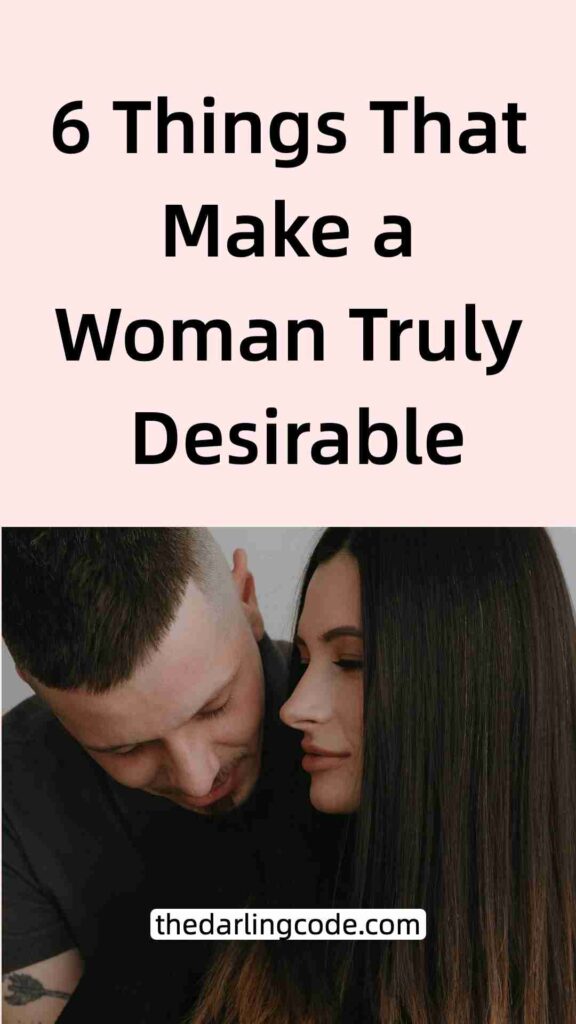What Makes a Woman Truly Desirable (Beyond Looks)
The experiences shared in this article are based on real emotional journeys, but all personal details are anonymized and used with the explicit written permission of the clients. Any resemblance to actual persons, living or dead, is purely coincidental. We are committed to treating all client stories with the utmost confidentiality and respect.
You know that moment in a coffee shop when you catch someone studying you not because of your outfit, but because your laughter just ignited the room? That is the magic we’re talking about today—the kind of allure that lingers long after first impressions fade.
As a relationship coach who’s spent years guiding women through modern dating’s messy, beautiful terrain, I’ve seen firsthand how true desirability isn’t about chasing trends or contorting into someone else’s ideal.
It’s about uncovering the quiet superpowers already within you.
Let’s be real: We live in a world that sells us “desirability” like it’s a TikTok filter—something to slap on for quick validation.
But the women I’ve coached (and learned from) have shown me that lasting magnetism has nothing to do with angles, aesthetics, or algorithms.
It’s about the quiet confidence of knowing who you are—flaws, contradictions, and all—and letting that truth breathe.
So let’s get into it.
Save this article for later—Pin it to Pinterest and come back when you need it! 📌

1. The Magnetic Power of Self-Awareness (Even When You’re a Hot Mess)
Let me tell you about Clara. When she first walked into my coaching practice, she handed me a color-coded spreadsheet titled “Why Am I Still Single??” Her “metrics” included things like “cooked homemade pasta 3x this month” and “got 52 Bumble matches.”
But when I asked, “What makes you feel most alive?” she froze. We’d meticulously tracked her “market value” but lost the plot entirely: her self-awareness.
Here’s the thing: Desirability starts with knowing what lights you up—and what drains you. Not what you think should light you up.
Actionable Step: Start a “Joy Inventory.”
For one week, jot down moments—even tiny ones—when you feel connected to your authentic self.
Did belting ’90s ballads in the shower make you giggle?
Did defending your coworker’s idea in a meeting light a fire in you? Patterns will emerge.
Self-awareness isn’t about having all the answers. It’s about asking better questions.
Years ago, during my own quarter-life crisis (yes, coaches have them too), I realized I’d been chasing “success” as defined by others—corner office, power suits, the works. Until one night, crying over lukewarm takeout at 11 PM, I asked: “Who am I trying to impress here?” Spoiler: It wasn’t me.
2. Softness as Strength (Without Being a Doormat)
Here’s a paradox I often share with clients: The women labeled “too nice” sometimes aren’t nice enough—to themselves. Softness isn’t about endless accommodation; it’s about boundaries wrapped in kindness.
Take my friend Jess. She ended a situationship with, “I care about you too much to keep pretending this is enough for me.” No theatrics, no blame—just clarity.
Contrast this with Sarah, a client who stayed in a lukewarm relationship for years, fearing she’d seem “needy” if she voiced her needs.
The kicker? Her partner later admitted, “I kept waiting for you to tell me what you wanted. I felt like I was guessing.”
Actionable Step: Practice “Velvet Steel” Communication.
Next time you’re tempted to mutter, “It’s fine!” when it’s clearly not, try this framework instead:
- Name the feeling: “I’ve been feeling uneasy about…”
- State the need: “…because I value consistency in plans.”
- Offer a solution: “Could we try [specific action] next time?”
Example: “I’d love to see you plan our next date—it makes me feel valued when you take initiative.”
3. The Courage to Take Up Space (Yes, Even in Heels)
Early in my career, I’d downplay my expertise, saying things like, “I’m just a relationship coach, but…” until a client bluntly asked, “Why do you sound apologetic for being good at your job?” Ouch.
Desirable women aren’t shrinking violets. They’re unafraid to:
- Say, “Actually, I disagree” in a boardroom.
- Own their desires in bed (or say, “Let’s slow down”).
- Admit, “I don’t know, but I’ll figure it out.”
Actionable Step: Eradicate Minimizing Language.
This week, delete these words from your vocabulary:
- “Just” (“I’m just checking in…” → “I’m checking in…”)
- “Sorry, but…” (Unless you actually spilled coffee on someone!)
A client, Maya, practiced this by rewiring how she talked about her art. Instead of, “It’s just a hobby,” she now says, “I create mixed-media pieces exploring grief and renewal.” Her confidence? A panty-dropper (figuratively… mostly).
4. Curiosity as a Love Language
The most captivating people I know are perpetually fascinated by the world—and it shows.
I once dated someone who asked, “What’s your weirdest childhood memory?” on our first date. We talked for hours; I barely noticed my smudged eyeliner.
Curiosity isn’t about performing intellect. It’s saying:
- “Tell me about the scar on your knee” instead of “What do you do?”
- “What’s something you’ve changed your mind about recently?” (Shoutout to client Hannah for that gem!)
Actionable Step: Ask “Un-LinkedIn” Questions.
Next conversation, skip the resume recap. Try:
- “What’s a belief you held tightly at 20 that makes you cringe now?”
- “If you had to teach a class on one random skill, what would it be?”
Pro tip: Watch their eyes light up when you invite them to share something real.
5. Emotional Agility: Dancing Through the Messy Stuff
Last summer, a client, Priya, was ghosted by someone she’d dated for months. Her first instinct? “I must’ve done something wrong.” But as we unpacked it, she realized: “He couldn’t handle depth. That’s his loss, not my flaw.”
Emotional agility—the ability to feel feelings without being hijacked by them—is catnip for mature connections.
Actionable Step: Try the “Pause & Protect” Method.
When triggered (e.g., a text left on read for days):
- Pause: Breathe for 10 seconds. Literally count them.
- Protect: Ask, “Is this about them, or an old wound of mine?”
- Proceed: Respond from clarity, not panic.
Example: Instead of firing off “??? Are we done???” try “I noticed things feel distant lately. Can we talk when you’re ready?”
6. The Art of Owning Your “Flaws” (Spoiler: They’re Superpowers)
Here’s a secret: My biggest “flaw”—my tendency to overthink—became my greatest strength in coaching. Clients don’t need someone who’s perfectly healed; they need someone who understands the messy middle.
Take Lisa, a client who hated her “bossy” nature. But when she reframed it as “decisive leadership,” she landed her dream job and a partner who adored her take-charge energy.
Actionable Step: Rebrand Your “Weaknesses.”
List 3 traits you criticize in yourself. Now, write how they could serve you.
Example:
- “Overemotional” → “Deeply empathetic”
- “Stubborn” → “Conviction-driven”
Final Words from The Darling Code
If you take nothing else from this, remember: True desirability isn’t a checklist. It’s a quiet rebellion against pretending.
Start small:
- Add one unapologetic joy to your week (dance alone, journal nude, wear the red lipstick).
- Delete one “should” from your vocabulary (“I should be more ___”).
- Text someone one specific thing you admire about them beyond their looks.
Your homework? Today, do something solely because it makes you feel deliciously alive.
With heart,
The Darling Code
PS: Save this to Pinterest. Then grab your “Joy Inventory” notepad and scribble one thing that made you feel like you today. Progress > perfection, always.
Got value from this article? Pin it to Pinterest for easy reference and help others discover it! 🌟


ABOUT THE AUTHOR
Vivienne, Relationship Coach & Self Love Coach
Vivienne is a Relationship Coach and Self-Love Coach who believes the key to great relationships starts with YOU. She helps individuals and couples build confidence, set healthy boundaries, and create connections that truly honor who they are.






